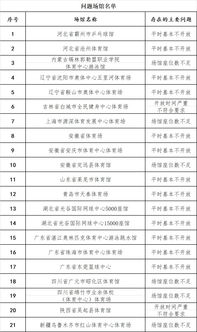中国职业体育存在的问题
Challenges in Professional Sports
Professional sports, while often celebrated for their entertainment value and ability to inspire millions, face a myriad of challenges in the modern era. These challenges range from ethical dilemmas to financial concerns, and addressing them effectively is crucial for the sustainability and integrity of the industry.
One of the foremost challenges in professional sports is the prevalence of ethical concerns. These can include issues such as doping, matchfixing, and the exploitation of athletes. Doping scandals tarnish the reputation of sports leagues and undermine the principles of fair play. Matchfixing not only compromises the integrity of competitions but also erodes the trust of fans. Additionally, the exploitation of athletes, particularly in terms of inadequate compensation and poor working conditions, raises serious ethical questions that demand attention.
Financial pressures represent another significant challenge in professional sports. While toptier leagues may enjoy lucrative television deals and sponsorship agreements, smaller leagues and teams often struggle to generate sufficient revenue. This economic disparity can widen the gap between wealthy and less affluent clubs, leading to issues of competitiveness and sustainability. Furthermore, the COVID19 pandemic has exacerbated financial pressures on sports organizations, with lost ticket sales and disrupted schedules affecting their bottom line.

The welfare of athletes is a critical concern that requires greater emphasis in professional sports. Highprofile cases of traumatic brain injuries, such as chronic traumatic encephalopathy (CTE) in American football, have prompted calls for improved player safety measures. Additionally, issues such as mental health support and postcareer transition assistance are increasingly recognized as vital components of athlete welfare. Sports organizations must prioritize the health and wellbeing of their athletes to ensure their longterm success and fulfillment.
Despite progress in recent years, professional sports still grapple with issues of diversity and inclusion. Women, racial minorities, and members of the LGBTQ community are often underrepresented in leadership positions and face barriers to participation. Addressing these disparities requires proactive efforts to promote diversity in hiring, create inclusive environments, and challenge discriminatory attitudes within sports culture. By embracing diversity and inclusion, professional sports can better reflect the communities they serve and foster greater equity and unity.
Corruption and governance failures pose significant threats to the integrity of professional sports. Instances of bribery, embezzlement, and mismanagement undermine trust in sports organizations and can have farreaching consequences. Effective governance structures, transparency measures, and anticorruption policies are essential for combating these challenges and upholding the values of accountability and fairness. Moreover, collaboration between sports governing bodies, law enforcement agencies, and regulatory authorities is crucial for detecting and addressing instances of corruption.
To address the challenges facing professional sports, stakeholders across the industry must work collaboratively to implement meaningful reforms. Some recommendations include:
By prioritizing ethics, fairness, and the wellbeing of athletes, professional sports can overcome these challenges and emerge as positive forces for social cohesion, entertainment, and inspiration.
